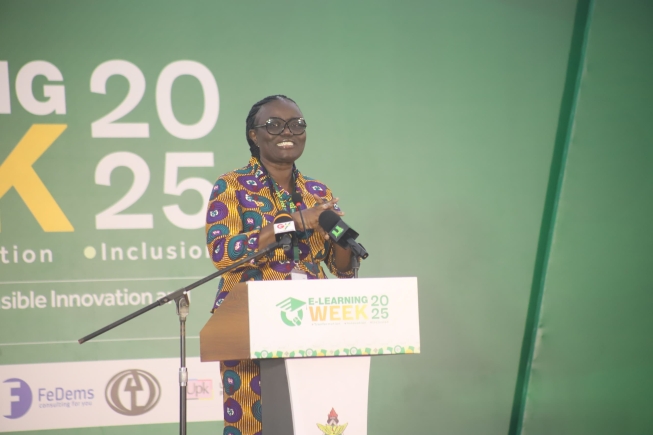The fourth edition of the E-learning Awareness Week has opened at the Kwame Nkrumah University of Science and Technology (KNUST).
The four-day event, organised by the university’s E-Learning Centre, is being held on the theme: “Transforming Education Through Responsible Innovation and Inclusion in the Digital Era.” It is being attended by students from 12 senior high schools, KNUST students, and other stakeholders.
Highlights
Key activities during the week include engagements with SHS students in practical lessons in robotics and artificial intelligence through RAIL-KNUST, and the Tek Smartest Quiz Competition, organised in collaboration with the SRC—a vibrant contest aimed at promoting digital literacy and academic excellence.
College-level activities, led by passionate College E-Learning Champions, will also feature prominently. These decentralised initiatives aim to ensure that each college engages meaningfully with the theme in ways that reflect their academic and technological contexts.
Other activities include a podcast discussion on artificial intelligence and plagiarism in tertiary education, featuring the Dean of QAPO, the University Librarian, and the Acting Pro Vice-Chancellor of GCTU. A parallel workshop on content creation for instructional designers will be facilitated by Dr Kim Welch.
Renowned digital storyteller Berthold Kobby Winkler, popularly known as WODE MAYA, is scheduled to speak on “Building Professionalism Through Storytelling.”
The week will climax with the much-anticipated E-Learning International Conference, which will feature renowned speakers from around the world. The event will also see the launch of the KNUST E-Learning Journal, a platform to advance research contributions and strengthen Ghana’s voice in the global e-learning discourse.
Leverage technology
Opening the awareness week at the Great Hall of KNUST on Monday, July 22, 2025, the Vice-Chancellor, Professor Rita Akosua Dickson, underscored the need to leverage technology responsibly for societal benefit.
“It is the responsible use of digital tools that we keep emphasising, so that at the end of the day you do not try to solve one problem and create other problems,” she said. “We believe that the true value of educational technology lies not just in improving efficiency, but in advancing equity and ensuring that no one is left behind.”
She expressed optimism that the event would bring together more innovators, educators, policymakers, researchers, industry partners, and stakeholders to exchange ideas and share best practices.
Digital access
In a keynote address delivered on his behalf, the Minister for Communications, Digital Technology and Innovations, Samuel Nartey George, said the government remained fully committed to deepening digital access and transforming education as a national priority.
He stated, “Our Ministry, in partnership with the Ministry of Education, is expanding broadband connectivity to rural and underserved communities through the Rural Telephony and Digital Inclusion Project. Over 2,000 communities are currently being connected to 4G mobile infrastructure, creating the digital foundation upon which education can thrive.”
He added that the private sector was also being engaged to provide more affordable smart devices to students and teachers, support the rollout of data bundles for e-learning, and develop content that is local, accessible, and interactive.
Coherent strategy
Mr George further noted that these interventions were not isolated efforts, but part of a coherent strategy to ensure that Ghana’s educational system is resilient, inclusive, and globally competitive.
Through partnerships with global tech companies, Ghanaian universities such as KNUST, and local innovation hubs, the Ministry, he said, plans to integrate coding into the curricula of schools, TVET institutions, and community learning centres.
He stressed that the interventions would also prioritise equity and inclusivity by promoting the active participation of girls, persons with disabilities, and youth in rural and underserved regions.
Essence of innovation
Speaking at the event, the Chief Executive Officer of Agri-Impact Limited, Mr Daniel Fahene Acquaye, an agribusiness expert, said the core purpose of innovation was to create jobs and improve livelihoods.
He acknowledged that although there are barriers to innovation, innovators must strive to overcome them in order to bring about societal change. He further called for stronger collaboration between academia and innovators to support national development.
Call to action
In his welcome address, the Director of the KNUST E-Learning Centre, Professor Eric Appau Asante, said the theme was a call to action and a recognition that while innovation is at the heart of modern education, it must be driven by responsibility, inclusion, and ethics.
“As we witness the rapid evolution of artificial intelligence, immersive technologies, and big data shaping teaching and learning, our responsibility is to ensure that these tools become instruments of equity, accessibility, and empowerment—rather than barriers that deepen educational divides,” he stated.

